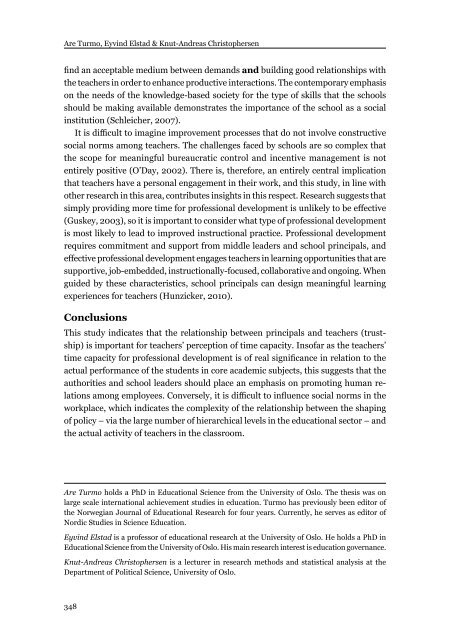Download issue - Umeå universitet
Download issue - Umeå universitet
Download issue - Umeå universitet
You also want an ePaper? Increase the reach of your titles
YUMPU automatically turns print PDFs into web optimized ePapers that Google loves.
Are Turmo, Eyvind Elstad & Knut-Andreas Christophersen<br />
find an acceptable medium between demands and building good relationships with<br />
the teachers in order to enhance productive interactions. The contemporary emphasis<br />
on the needs of the knowledge-based society for the type of skills that the schools<br />
should be making available demonstrates the importance of the school as a social<br />
institution (Schleicher, 2007).<br />
It is difficult to imagine improvement processes that do not involve constructive<br />
social norms among teachers. The challenges faced by schools are so complex that<br />
the scope for meaningful bureaucratic control and incentive management is not<br />
entirely positive (O’Day, 2002). There is, therefore, an entirely central implication<br />
that teachers have a personal engagement in their work, and this study, in line with<br />
other research in this area, contributes insights in this respect. Research suggests that<br />
simply providing more time for professional development is unlikely to be effective<br />
(Guskey, 2003), so it is important to consider what type of professional development<br />
is most likely to lead to improved instructional practice. Professional development<br />
requires commitment and support from middle leaders and school principals, and<br />
effective professional development engages teachers in learning opportunities that are<br />
supportive, job-embedded, instructionally-focused, collaborative and ongoing. When<br />
guided by these characteristics, school principals can design meaningful learning<br />
experiences for teachers (Hunzicker, 2010).<br />
Conclusions<br />
This study indicates that the relationship between principals and teachers (trustship)<br />
is important for teachers’ perception of time capacity. Insofar as the teachers’<br />
time capacity for professional development is of real significance in relation to the<br />
actual performance of the students in core academic subjects, this suggests that the<br />
authorities and school leaders should place an emphasis on promoting human relations<br />
among employees. Conversely, it is difficult to influence social norms in the<br />
workplace, which indicates the complexity of the relationship between the shaping<br />
of policy – via the large number of hierarchical levels in the educational sector – and<br />
the actual activity of teachers in the classroom.<br />
Are Turmo holds a PhD in Educational Science from the University of Oslo. The thesis was on<br />
large scale international achievement studies in education. Turmo has previously been editor of<br />
the Norwegian Journal of Educational Research for four years. Currently, he serves as editor of<br />
Nordic Studies in Science Education.<br />
Eyvind Elstad is a professor of educational research at the University of Oslo. He holds a PhD in<br />
Educational Science from the University of Oslo. His main research interest is education governance.<br />
Knut-Andreas Christophersen is a lecturer in research methods and statistical analysis at the<br />
Department of Political Science, University of Oslo.<br />
348

















